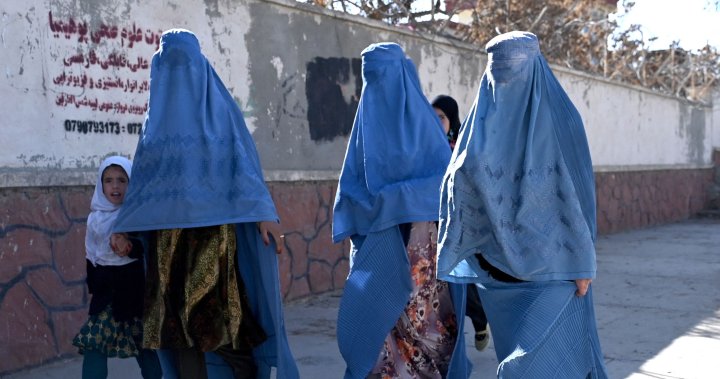Life as a woman in Taliban-ruled Afghanistan just got even more restrictive as a government ministry enacts new laws on “vice and virtue” in the country, banning women’s voices and uncovered faces from public life.
The laws were issued Wednesday by the ministry for the “propagation of virtue and the prevention of vice,” which was established in 2021 after the Taliban seized control of Afghanistan.
That was the year the U.S. military and other western powers, including Canada, evacuated the country, leaving behind a power vacuum quickly filled by the militant group. Many Afghans who worked for western powers, including drivers and interpreters, were left behind in the chaotic departure.
The new rules were laid out in a 114-page document that covers vast aspects of everyday public life, according to The Associated Press, which viewed the document. This marks the first formal declaration of “virtue laws” in Afghanistan since the takeover.
“Inshallah we assure you that this Islamic law will be of great help in the promotion of virtue and the elimination of vice,” ministry spokesman Maulvi Abdul Ghafar Farooq said on Thursday. The laws were approved by supreme leader Hibatullah Akhundzada on Wednesday.
Article 13 of the document concerns women, and lays out how a woman should clothe and conduct herself in public.
It is now mandatory for women to veil their entire bodies, including their faces, at all times in public to avoid temptation and tempting others. This means that the common Islamic head-covering, the hijab, which covers the hair and neck but not the face, is no longer considered appropriate.

Get daily National news
Get the day’s top news, political, economic, and current affairs headlines, delivered to your inbox once a day.
Women are also forbidden from singing, reciting and reading aloud in public, as a woman’s voice is deemed “intimate” and should not be heard. It’s unclear if speaking is also banned.
The laws also note that women cannot look at men they are not related to by blood or marriage and vice versa.
Breaking these rules could result in warnings, confiscations of property or detention of up to three days. The ministry has already been enforcing similar morality requirements and says it has detained thousands of people for violations.
“A lot of these rules were in place already but less formally and now they are being formalized. I think this is a sign of what we’ve been seeing over the last three years which is a steady and gradual escalation of the crackdown,” said Heather Barr, associate director of Human Rights Watch’s women’s rights division.
The new laws come after the Taliban already placed harsh restrictions on women’s freedoms after the takeover. In 2022, the group banned women from attending school after the sixth grade, when previously, women could attend high schools and universities.
Afghan women hold placards as they march to protest for their rights in Kabul on April 29, 2023, defying a dissent crackdown.
AFP via Getty Images
One woman from Afghanistan, who was one year away from graduating with a law degree, told Global News last year that she “couldn’t speak for a few minutes” after learning that she would have to abandon her education.
“Home is like jail for us and we will fight until we legalize our human basic rights without any discrimination,” she said.
The Taliban also banned women from working at non-governmental organizations (NGOs) in 2022. Another woman who spoke to Global News said her family was plunged into poverty after she had to give up her job at an NGO.
“I am the breadwinner of my family. We are just four persons in my family: me, my sister and my parents. My father is sick now. We don’t have anything in our kitchen to prepare for dinner or for our night,” she said. “It’s so hard for me. I don’t know how I can continue my life.”
Apart from the new restrictions on women, the laws passed on Wednesday also ban the playing of music and bar men from shaving their beards as well as skipping prayer and religious fasts.
The laws also instruct drivers to not transport women without a male guardian, and passengers and drivers must perform prayers at designated times.
Media in Afghanistan must now abide by Sharia law, meaning the publication of images depicting living beings is forbidden, in line with the Islamic prohibition of idolatry.
Last month, a UN report said the ministry was contributing to a climate of fear and intimidation among Afghans through edicts and the methods used to enforce them.
“Given the multiple issues outlined in the report, the position expressed by the de facto authorities that this oversight will be increasing and expanding gives cause for significant concern for all Afghans, especially women and girls,” said Fiona Frazer, the head of the human rights service at the UN mission in Afghanistan.
The Taliban rejected the UN report.
—
— With files from The Associated Press, Reuters and Global News’ Shogofa Danish and Touria Izri
© 2024 Global News, a division of Corus Entertainment Inc.







